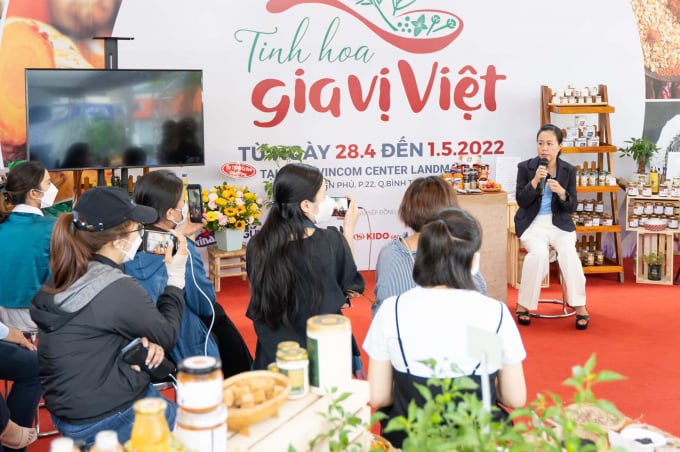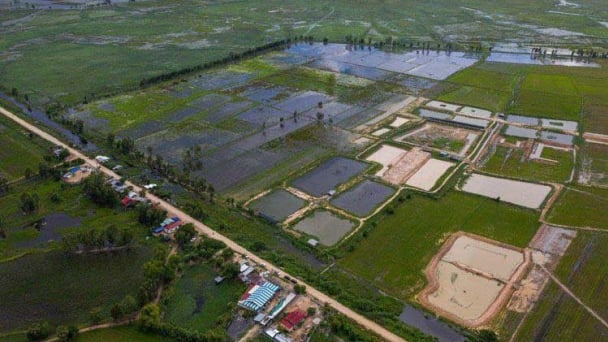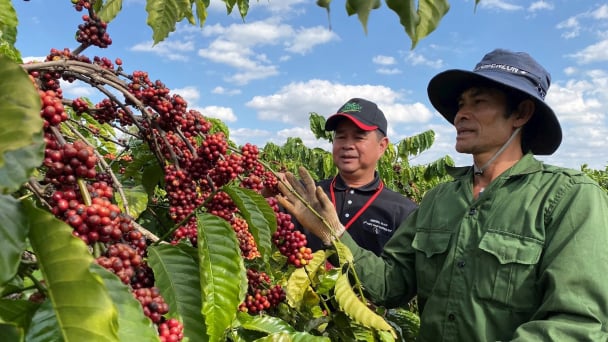May 15, 2025 | 01:03 GMT +7
May 15, 2025 | 01:03 GMT +7
Hotline: 0913.378.918
May 15, 2025 | 01:03 GMT +7
Hotline: 0913.378.918

Nguyen Thi Van Anh, Director of Tri Viet Phat Trading - Service and Production Co., Ltd. shares her experience in achieving international standards and conquering international markets with young startups at the Essense of Vietnam Spices Festival 2022. Photo: Nguyen Thuy
Sharing about the story of being able to export one container of chili sauce to the US every month with entirely Vietnamese chili varieties at the "Flow of the spice market" seminar organized by the Vietnam High Quality Goods Business Association, Ms. Nguyen Thi Van Anh, Director of Tri Viet Phat Trading - Service and Production Co., Ltd. shared pridefully.
Graduating Chemistry and Food Major from Ho Chi Minh City University of Science and Technology in 2002, after graduation, Ms. Van Anh started the path of spice manufacturing with a strong love and passion, a burning loyalty to the profession, with the rich indigenous resources of Vietnam, especially Vietnamese spices. But at that time, she worked in the shoes of a hired worker.
“I was one of the members from the spice research team for Taiwan's most famous Noodle Company, entering the Vietnamese market. My employer at that time was Taiwanese, everyday he forced us to mince fresh spices to feel, smell and distinguish the taste of each type of onion, anise, chili, herbs… My employer was a foreigner but he has been very interested in the typical aroma of many Vietnamese herbs and spices, so he helped me to explore. Since then, passion for spices has stuck with me”, shared Ms. Van Anh.
She noticed that foreigners are also very interested in Vietnamese spice products. This is one of the potential agricultural products. But every year, Vietnamese spices such as cinnamon, anise, cloves, cardamom... are only exported raw. Therefore, with the perspective of a food manufacturer, research and development in favor of production, Ms. Van Anh began to rekindle the idea of simulating chef's dishes to package into products that can be moved from place to place, to all countries around the world, so that many people worldwide can feel and love the taste of Vietnamese spices.
In 2012, Tri Viet Phat Trading - Service and Production Co., Ltd was established, mainly supplying to customers who are Food factories. The first goal is to supply pepper to sausage companies. The opportunity opened for Tri Viet Phat at that time was in 2015 - 2016 when Kin Do traded with Mondelez Corporation in the US, the order at that time was only chili powder.

Tri Viet Phat's products are well received by domestic and foreign consumers. Photo: Nguyen Thuy.
“At that time, Mondelez - Kinh Do wanted to change, standardize suppliers, support suppliers to standardize and achieve global standard quality. Meanwhile, we are just a very small startup company. Supplying orders for Kinh Do is a big challenge when they are buying spices from other big companies”, shared Ms. Van Anh.
With her determination, as well as that of young employees - a team of chemical engineers, helped Tri Viet Phat "conquer" big customers, not only Mondelez - Kinh Do, but also fastidious Japanese customers.
“Japanese people really like traditional Vietnamese dishes, however, the question is how to bring Vietnamese spices to them? Therefore, I made a pho seasoning packet with concentrated chicken juice and packaged it to bring to the distant land of Japan the typical flavor of Vietnamese pho. The Japanese like to eat instant products but they also require nutrition, they are very delicate and demanding. For them, business is not just a business, but they also require cultural elements in the product. That's what I learned when I made products for the Japanese market", said Ms. Van Anh.
After a period of supplying to customers consisting of food factories, in 2021, Tri Viet Phat decided to create its own products and face many new challenges in today's competitive open market.
“Initially, we went to offer Kim Quat chili salt and was accepted by Bach Hoa Xanh, then received very good feedback. Currently, the product has been widely distributed from the West to Quang Tri", said the Director of Tri Viet Phat.
With the business motto, do not consider competitors as enemies, but observe their good achievements to learn, always find new directions, new products, avoid remaking products that other units have made. By now, every month, Tri Viet Phat has been able to export a container of chili sauce to the US for the Americans' daily use (not just the Vietnamese in the US - reported) made up of entirely Vietnamese chili varieties such as green chili, Ba Tri chili, Bird's eye chili and farmed chili… thereby helping to increase income for farmers.
One of the factors that helps Tri Viet Phat's spice products stand out in the domestic market as well as export is the standardization ò the process right from the beginning, then moving on to building the factory. At the same time, it is important to learn about the requirements, preferences and culinary tastes of each customer in each market, then Tri Viet Phat's team of experts will analyze the parameters, try by tastes... to produce spice products that match customer requirements. “To research a new spice product, the process usually takes about 4-5 months to standardize for each market. In 2019, Tri Viet Phat had the honor of receiving the FSSC 22000, ISO 22000, HACCP, FDA, FCE, FSPCA certifications", shared Ms. Van Anh.
According to Ms. Van Anh, Vietnam's spice market brings many potential, especially spices in the form of sauces and dry powders for huge sales. Specifically, despite being affected by the Covid-19 pandemic, Tri Viet Phat still sold over 50,000 bottles of chili pepper salt, helping to reach 121 billion VND in sales in 2021, an increase of nearly 40% compared to 2020. In addition, this business also developed well in the retail segment through online sales, with sales of up to 500 million VND/month.
In order to standardize products and conquer difficult export markets, all input materials must be strictly inspected. For the past three years, cooperation with a Japanese partner in Vietnam has brought Tri Viet Phat's a revenue of 1-1.2 billion VND/month. “The company just exported 30,000 containers of pho spice products to Japan. At the end of May 2022, we continue to export a container of 200,000 spice products of beef vermicelli, fish sauce vermicelli, fish vermicelli... to sell at Japanese Costco supermarket”, said Ms. Van Anh.
Analyzing the potential of the spice market in food processing, Ms. Van Anh said that for each dish, using different spices will produce different products. For example, for instant noodles or snack cakes, the main ingredients are flour and potatoes, but when we put in different spices, it will produce unique products, creating unique dishes but still delicious and full of flavor. In addition, chains of restaurants and eateries that want to have a standard and uniform taste also need ready-made spices. Consumers are also increasingly liking the quickness and convenience of products to reduce kitchen work, encouraging Vietnamese women to cook delicious, nutritious meals with more diverse ingredients.
Not only that, through the Covid-19 pandemic, many food processing factories could not import raw materials, so they had to find an alternative domestic source, which is also an opportunity for spice manufacturers to expand their domestic market.
“Due to the recovery of the economy, the development of the food processing, restaurant and hotel industries leads to the growth of the spice industry. With an international standard factory, the company is sought by interested partners. In 2022, the company aims to grow up to 50%, expected sales to reach 180 billion (excluding exports)", Ms. Van Anh expected.
Currently, Tri Viet Phat's products such as kimchi spice, traditional meat marinade, kim kumquat dipping sauce, complete soup spices... are well received by Vietnamese consumers and have been exported to markets such as: the USA, Japan, Korea, Canada...
Translated by Nguyen Hai Long

(VAN) Use of high-quality broodstock and biotechnology is regarded as the most effective approach to ensuring sustainable and economically viable shrimp aquaculture ahead of climate change and the emergence of increasingly intricate disease patterns.

(VAN) Carbon farming is a form of agricultural practices that helps absorb more greenhouse gases than it emits, through smart management of soil, crops, and livestock.

(VAN) This is a key content of the Memorandum of Understanding recently signed between the Vietnam Fisheries Society and Kunihiro Inc of Japan.

(VAN) To achieve the goal, local authorities and businesses in Kon Tum province have fully prepared the necessary conditions for the new Ngoc Linh ginseng planting season.

(VAN) Jiangsu province is gearing up to host training programs in Phnom Penh, the capital of Cambodia, this year to establish the Fish and Rice Corridor.

(VAN) Le Hoang Minh, representing Vinamilk, shared the company's experience in energy saving and green energy transition for production at a workshop held during the P4G Summit.

(VAN) Businesses emphasize fairness and equality when integrating social factors into their sustainable development strategies.